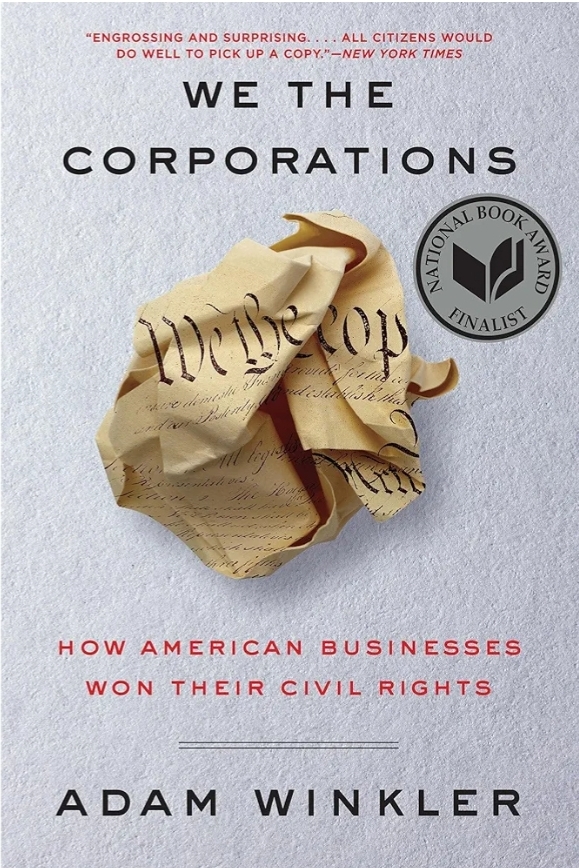“We the Corporations: How American Businesses Won Their Civil Rights” by Adam Winkler is a historical account of how corporations in the United States fought for and gradually won many of the same rights as individuals. Winkler, a law professor at UCLA, presents a compelling narrative that traces the legal and political journey of corporate rights from the nation’s founding to the present day.
Key Themes and Details:
Corporations as Legal Persons:
- Winkler explores the concept of corporate personhood, the idea that corporations, though not individuals, have some of the same legal rights as people. The book details the development of this notion, which allows corporations to enter contracts, sue and be sued, and exercise rights under the Constitution.
Early Legal Battles:
- The book traces the roots of corporate rights back to the early days of the United States, showing how corporations were originally chartered by governments with strict limits on their activities. Over time, however, corporations began to push for greater legal recognition and autonomy.
- A key early case, Dartmouth College v. Woodward (1819), established that corporations had protections under the Contract Clause of the Constitution, preventing states from altering corporate charters at will.
Civil War Amendments and Corporate Rights:
- Winkler delves into how the Fourteenth Amendment, which was intended to protect the rights of newly freed slaves, was repurposed by corporate lawyers to defend corporate interests. This amendment became a pivotal tool in corporate litigation, with the argument that corporations were “persons” under the law deserving of equal protection.
Citizens United and Modern Corporate Rights:
- The book details the landmark Citizens United v. Federal Election Commission (2010) decision, which gave corporations the right to spend unlimited amounts of money on political campaigns. Winkler describes this case as the culmination of a long struggle by corporations to achieve First Amendment rights, equating corporate political spending with free speech.
- This decision sparked widespread debate about the influence of money in politics and raised concerns about corporate power undermining democratic processes.
Corporations and Civil Rights:
- Throughout the book, Winkler highlights how corporations have been portrayed in legal battles as minorities seeking civil rights, akin to marginalized groups like African Americans and women. By drawing parallels between corporate rights and civil rights, corporations have been able to expand their legal protections.
The Role of the Supreme Court:
- Winkler offers an in-depth look at how the Supreme Court has been instrumental in expanding corporate rights over the years. Key cases like Santa Clara County v. Southern Pacific Railroad (1886), which is often cited (incorrectly) as the case that established corporate personhood, show how the Court played a role in shaping the legal framework for corporate rights.
- Other cases discussed include Buckley v. Valeo (1976), which laid the groundwork for later campaign finance cases by equating money with speech.
Influence of Corporate Lawyers:
- A recurring theme in the book is the role of corporate lawyers in pushing for the expansion of corporate rights. Winkler details the behind-the-scenes legal strategies used by attorneys who worked diligently to win rights for corporations, often drawing on constitutional principles that were originally intended for individual citizens.
Corporations and the Constitution:
- Winkler emphasizes how corporations have used the Constitution to their advantage, often invoking the First, Fourth, and Fourteenth Amendments. He highlights the irony that while corporations gained rights, many of these victories did not necessarily translate into broader protections for individual citizens, particularly workers or consumers.
Critique of Corporate Power:
- While the book is largely a historical and legal analysis, Winkler raises concerns about the implications of corporate rights for democracy. He questions whether corporations, with their vast resources and political influence, have too much power in the American legal and political systems.
Conclusion:
“We the Corporations” is a thorough and accessible history of the rise of corporate power in America, with an emphasis on how corporations secured many of the same rights as individuals. Winkler’s detailed account of landmark legal cases and the role of corporate lawyers shows how corporate rights have evolved over time, culminating in decisions like Citizens United that have reshaped the American political landscape. The book is essential reading for anyone interested in understanding the legal and historical foundations of corporate power in the United States and its implications for democracy.







